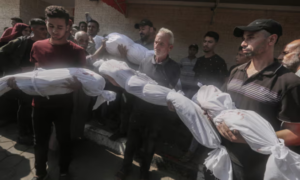How Palestinians look back on 7 October a year later

Palestinians holding shrouded bodies at Al-Aqsa hospital in Deir al-Balah, Gaza, on 10 July 2024
Muhammad Shehada reports in The New Arab on 10 October 2024:
A year on from the start of Israel’s deadliest war on Gaza, 54% of Palestinians say they support Hamas’ decision to launch attacks on Israel on 7 October 2023, which killed 1,200 Israelis, including soldiers and civilians.
This support has repeatedly been cited by Israel’s government to justify the mass killing of over 42,000 Palestinians in Gaza over the last 12 months, including 17,000 children, and the destruction of 70% of the besieged territory.
The International Court of Justice (ICJ) has found it plausible that Israel’s actions amount to genocide, while the International Criminal Court (ICC) has issued a request for arrest warrants for Israeli Prime Minister Benjamin Netanyahu, Israeli Defence Minister Yoav Gallant, as well for three Hamas leaders, including Yahya Sinwar, for alleged war crimes and crimes against humanity.
While used by Israel to justify the destruction of Gaza, Palestinian attitudes to Hamas’ attack reveal a more complex picture: what exactly do Palestinians support about that fateful day? Why? And in what context does this support occur?
No support for atrocities
The source for these figures, the Palestinian Center for Policy and Survey Research (PSR), notes in its poll conducted from 3-7 September in the West Bank and Gaza that support for Hamas’ attack among Palestinians “does not necessarily mean support for Hamas and does not mean support for any killings or atrocities committed against civilians”.
The PSR adds that almost 90% of the Palestinian public believes that Hamas militants did not commit alleged or documented atrocities on that day, and either attribute them to others present or question their genuineness.
The Hamas-led attack consisted of two waves, with the first consisting of elite Hamas militants, the Nukhba forces, that predominantly focused on Israeli military bases surrounding Gaza.
